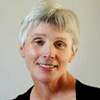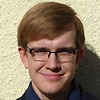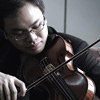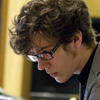Chris Bourke interview - Page 2
Chris: When formal training started.
Douglas: There was a very good teacher in Oamaru called Miss Cartwright and she sent me to Ernest Empson in Christchurch and of course when I went there to the University I was able to take Music 1 with Dr Bradshaw and moved on from there. When I wrote my first piano sonata, I didn't know the name of a chord even [laughs] I just did it from intuition. It was a mixture of the Beethoven Pathétique and the Mozart Coronation Concerto and the Liszt Rhapsody, which were things I knew. The teaching at Christchurch was pretty good, but old fashioned I think at the University.
Chris: You never did the final exercise for your Bachelor of Music.
Douglas: No I didn't because I went off to London at that stage. In fact I was attempting to write an exercise on the text taken from T.S. Eliot's The Waste Land, and understandably I came to grief! And had to abandon it. But I think I could readily enough have put in a work for chorus and orchestra two or three years later, I'd written a large work for the Royal College in London but it never occurred to me to do this for some reason.
Chris: Wasn't important to finish.
Douglas: It didn't occur to me that I would finish up in a University job. Because there were only three jobs in the country, three Professors of Music, and that seemed to be all that was offering. I just wondered whether I was very practical about anything at that time at all - probably getting along in a dream of some kind! I had some crazy idea that I wanted to be a composer so I think I had made the decision. It was a ridiculous profession to choose, offering no opportunities, no income offering. There was a good deal going on musically in Christchurch even during the War years. There were two very good choirs and a lot of chamber music organ recitals of course in the cathedrals, but I think probably the most important event was the establishment of the National Orchestra in 1946.
Chris: At Waitaki, first idea to compose came during lunch.
Douglas: That's right [laughs] I couldn't wait to get out and get it down. I'd been playing piano perhaps five years in a haphazard way.
Chris: Bach Inventions.
Douglas: No! I played dreadful things by Chaminade and used to try and bash my way through a Liszt Hungarian Rhapsody.
Chris: Romantic parlour stuff.
Douglas: It was Ernest Empson who when I was eighteen put me on to Bach Inventions - and high time too.
Chris: Interesting you didn't feel urge until then.
Douglas: No, well I was interested in other things, I learnt shorthand and typing, and tried to write short stories, I was interested in designing houses, and I used to read enormously and widely.
Chris: Being final son, no pressure on you to return and carry farm on.
Douglas: Not at all - I had three elder brothers - all farming. I think they were just baffled by me.
Chris: Father once said…
Douglas: Oh yes, "If it had to be music, couldn't it have been the bagpipes". He liked the bagpipes because he was brought up in Scotland, just as he liked Sir Walter Scott and Robert Burns but he didn't like Shakespeare.
Chris: He grew up in Scotland.
Douglas: He was born in about 1866. He took up land in the Mangamahu between Whangaehu and Turakina in 1890 and that was two years after he arrived here. Because he took about two years to move around and look at various parts of the country, learn the conditions of farming.









